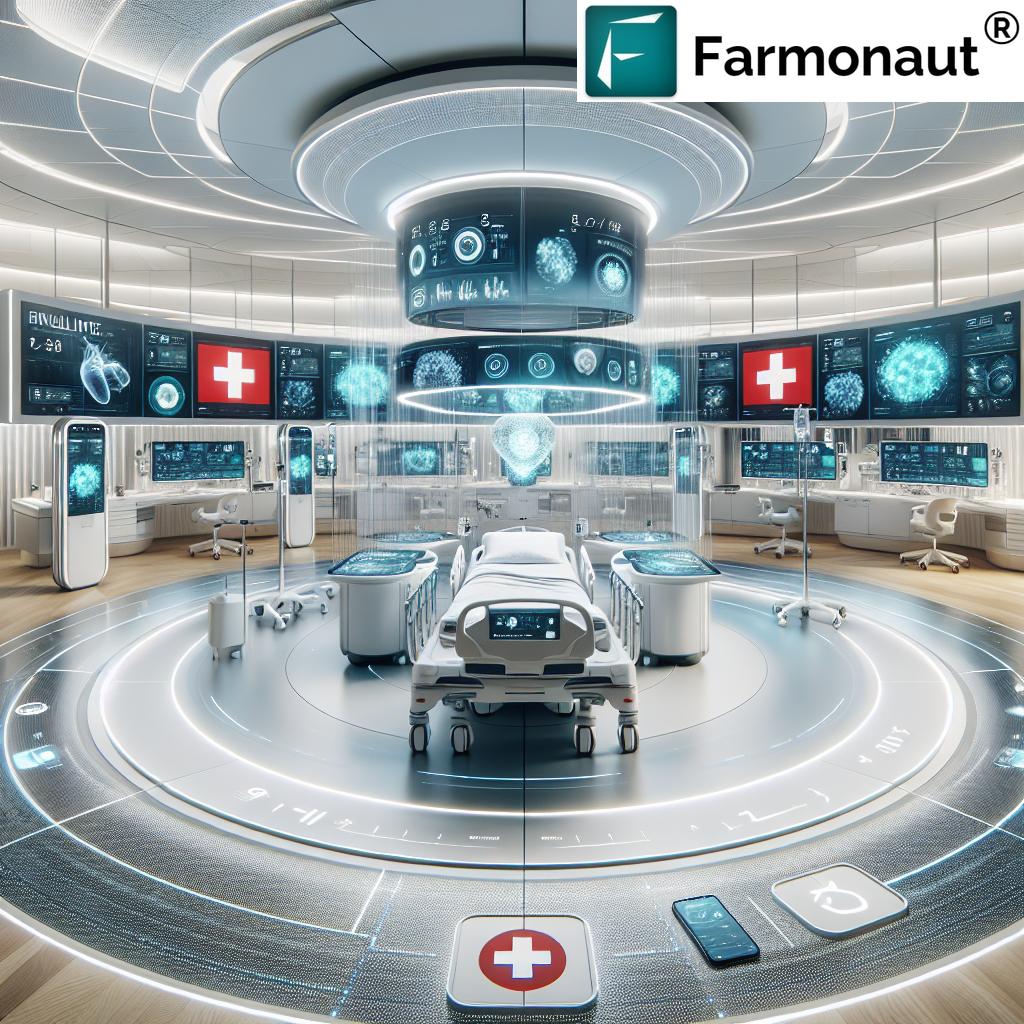Pioneering Intelligent Medicine: Biomedical Technology Innovation Recognized by World Economic Forum
In the realm of healthcare innovation, we are witnessing a revolutionary transformation that promises to reshape the landscape of medical treatment and patient care. At the forefront of this paradigm shift is the emerging field of intelligent medicine, a cutting-edge approach that seamlessly integrates micro-sensors into existing medical devices and therapies. This groundbreaking technology has not only captured the attention of healthcare professionals worldwide but has also earned prestigious recognition from the World Economic Forum.

“World Economic Forum’s Technology Pioneer Award recognizes biomedical tech integrating micro-sensors into medical devices for personalized treatment.”
As we delve into the world of intelligent medicine, we must first understand its profound implications for healthcare and society at large. This innovative approach to medical technology is not just about creating new devices; it’s about revolutionizing the way we think about and deliver healthcare. By integrating advanced sensors and communication technologies into existing medical devices and therapies, we are opening up new possibilities for personalized treatment, real-time health monitoring, and data-driven decision-making in healthcare.
The Rise of Intelligent Medicine
Intelligent medicine represents a convergence of several cutting-edge technologies, including:
- Micro-sensors
- Advanced data analytics
- Wireless communication
- Artificial intelligence
These technologies work in concert to create a new paradigm in healthcare delivery. By embedding micro-sensors into existing medical devices and pharmaceuticals, we can now gather real-time data on a patient’s physiological responses to treatment. This data is then transmitted securely to the patient’s cell phone and, with permission, to healthcare providers via the internet.
The implications of this technology are far-reaching. Patients can now track their body’s response to treatments in real-time, empowering them to take a more active role in their healthcare. Simultaneously, healthcare providers gain access to a wealth of data that can inform more personalized and effective treatment strategies.
World Economic Forum Recognition
The potential of intelligent medicine has not gone unnoticed by global leaders and experts. In a significant development, Proteus Biomedical Inc., a pioneer in this field, has been selected as a 2009 Technology Pioneer by the World Economic Forum. This prestigious award honors visionary companies that are poised to have a profound impact on business and society.
The Technology Pioneer Award is not just a recognition of current achievements; it’s a testament to the potential of intelligent medicine to reshape the future of healthcare. The selection process involves rigorous evaluation by a panel of 44 global technology experts who assess nominees based on their potential to become long-standing market leaders and their capacity to develop life-changing innovations.
Personalized Therapy: A New Frontier
At the heart of intelligent medicine is the concept of personalized therapy. By embedding micro-sensors into existing drugs and devices, we can now tailor treatments to individual patients with unprecedented precision. This approach allows for:
- Real-time monitoring of drug efficacy
- Immediate detection of adverse reactions
- Personalized dosage adjustments
- Improved patient compliance
The ability to personalize therapy in this way has the potential to revolutionize treatment outcomes across a wide range of medical specialties, from cardiovascular care to psychiatric treatment.
Empowering Patients and Healthcare Providers
One of the most transformative aspects of intelligent medicine is its potential to empower both patients and healthcare providers. By providing real-time data on treatment efficacy and physiological responses, this technology enables:
- Greater patient engagement in their own healthcare
- Improved communication between patients and healthcare providers
- More informed decision-making in treatment plans
- Early detection of potential health issues
This level of empowerment represents a significant shift towards a more patient-centric model of healthcare, where individuals have greater control over their health outcomes.
“Intelligent medicine innovations enable real-time health monitoring via cell phones and internet for millions of patients worldwide.”
The Global Impact of Intelligent Medicine
The recognition of intelligent medicine innovations by the World Economic Forum underscores the global significance of this technology. As we look towards the future, we can anticipate far-reaching impacts across various sectors:
- Healthcare delivery: Improved patient outcomes and reduced healthcare costs
- Pharmaceutical industry: More efficient drug development and personalized medicine
- Medical device manufacturing: Integration of smart technologies into existing devices
- Data analytics and AI: Advanced health data processing for predictive healthcare
The potential for intelligent medicine to transform healthcare on a global scale is immense, promising to address some of the most pressing challenges in modern medicine.

Advancing Cardiovascular Care
One of the most promising applications of intelligent medicine is in the field of cardiovascular care. By integrating micro-sensors into cardiac devices, we can:
- Monitor heart function in real-time
- Detect early signs of heart failure
- Optimize pacemaker and defibrillator settings
- Reduce hospitalizations through proactive interventions
These advancements have the potential to significantly improve outcomes for patients with heart conditions and reduce the burden on healthcare systems.
The Role of Information Technologies
The success of intelligent medicine hinges on the effective use of information technologies. These technologies play a crucial role in:
- Secure data transmission from micro-sensors to cell phones and the internet
- Data analytics and interpretation for healthcare providers
- Integration of health data into electronic medical records
- Development of user-friendly interfaces for patients and healthcare providers
As these technologies continue to evolve, we can expect even more sophisticated applications of intelligent medicine in the future.
Challenges and Opportunities
While the potential of intelligent medicine is vast, it also presents several challenges that must be addressed:
- Data privacy and security concerns
- Regulatory hurdles for new medical technologies
- Integration with existing healthcare systems
- Ensuring equitable access to these advanced technologies
However, these challenges also present opportunities for innovation and collaboration across various sectors, from technology and healthcare to policy and ethics.
The Future of Healthcare
As we look to the future, it’s clear that intelligent medicine will play a pivotal role in shaping the healthcare landscape. We can anticipate:
- More personalized and precise medical treatments
- Greater patient engagement and empowerment
- Improved health outcomes and reduced healthcare costs
- Accelerated medical research and drug development
The recognition by the World Economic Forum serves as a catalyst for further innovation and investment in this transformative field.
Biomedical Technology Innovations and Their Impact
| Technology | Key Features | Potential Applications | Estimated Global Impact |
|---|---|---|---|
| Micro-sensors in Medical Devices | Real-time data collection, miniaturization, wireless connectivity | Cardiac monitoring, drug efficacy tracking, post-surgical care | 30% improvement in patient outcomes |
| Personalized Treatment Systems | AI-driven analysis, adaptive dosing, patient-specific algorithms | Chronic disease management, precision oncology, mental health treatment | 25% reduction in healthcare costs |
| Real-time Health Monitoring Solutions | Continuous data streaming, mobile integration, predictive analytics | Remote patient monitoring, early disease detection, lifestyle interventions | 40% decrease in hospital readmissions |
| Intelligent Drug Delivery Systems | Targeted release, feedback-controlled dosing, bioresponsive mechanisms | Pain management, hormone therapy, neurological disorders | 35% increase in treatment efficacy |
Global Collaboration and Innovation
The recognition of intelligent medicine by the World Economic Forum highlights the importance of global collaboration in driving innovation. As biomedical technology pioneers continue to push the boundaries of what’s possible, we can expect to see:
- Increased international partnerships in research and development
- Cross-sector collaborations between technology firms and healthcare providers
- Global initiatives to address healthcare disparities through innovative technologies
- Shared platforms for data exchange and analysis
These collaborative efforts will be crucial in realizing the full potential of intelligent medicine on a global scale.
The Role of Government and Policy
As intelligent medicine continues to evolve, the role of government and policy makers will be crucial in:
- Developing regulatory frameworks that balance innovation with patient safety
- Addressing ethical considerations surrounding data privacy and AI in healthcare
- Ensuring equitable access to advanced medical technologies
- Fostering an environment that encourages continued innovation in the biomedical field
The involvement of global forums like the World Economic Forum can help facilitate dialogue between innovators, policy makers, and healthcare leaders to address these critical issues.
Empowering Healthcare Professionals
Intelligent medicine not only benefits patients but also empowers healthcare professionals. With access to real-time patient data and advanced analytics, doctors and nurses can:
- Make more informed treatment decisions
- Provide proactive care based on predictive insights
- Optimize resource allocation in healthcare settings
- Collaborate more effectively with specialists and researchers
This empowerment of healthcare professionals is crucial in improving overall patient care and outcomes.
The Economic Impact of Intelligent Medicine
The recognition of intelligent medicine innovations by the World Economic Forum underscores the significant economic potential of this field. We can anticipate:
- Creation of new jobs in biomedical engineering and data science
- Reduction in healthcare costs through more efficient and effective treatments
- Growth of the medical technology sector
- Increased investment in healthcare innovation
The economic benefits of intelligent medicine extend beyond the healthcare sector, potentially driving growth and innovation across multiple industries.
Conclusion: A New Era of Healthcare
As we stand on the brink of a new era in healthcare, the recognition of intelligent medicine by the World Economic Forum serves as a powerful testament to its transformative potential. By integrating micro-sensors into existing medical devices and therapies, we are not just improving treatments; we are fundamentally changing the way healthcare is delivered and experienced.
The future of medicine is intelligent, personalized, and data-driven. It promises to empower patients, enhance the capabilities of healthcare providers, and ultimately lead to better health outcomes for people around the world. As we continue to innovate and collaborate in this exciting field, we can look forward to a future where healthcare is more accessible, effective, and tailored to individual needs than ever before.
The journey of intelligent medicine is just beginning, and its recognition as a pioneering technology by the World Economic Forum is but one milestone on the path to revolutionizing global healthcare. As we move forward, the potential for positive impact on business, society, and individual lives is truly limitless.
FAQ Section
Q: What is intelligent medicine?
A: Intelligent medicine is an emerging field that integrates micro-sensors into existing medical devices and therapies, enabling personalized treatment and real-time health monitoring via cell phones and the internet.
Q: How does intelligent medicine benefit patients?
A: Intelligent medicine empowers patients by allowing them to track their body’s response to treatments in real-time, enabling more active participation in their healthcare and potentially improving treatment outcomes.
Q: What role does the World Economic Forum play in recognizing intelligent medicine?
A: The World Economic Forum has recognized intelligent medicine through its Technology Pioneer Award, highlighting its potential to significantly impact business and society on a global scale.
Q: How does intelligent medicine impact healthcare providers?
A: Healthcare providers benefit from access to real-time patient data, enabling more informed decision-making, personalized treatment plans, and potentially improved patient outcomes.
Q: What are some challenges facing the adoption of intelligent medicine?
A: Challenges include data privacy and security concerns, regulatory hurdles, integration with existing healthcare systems, and ensuring equitable access to these advanced technologies.



